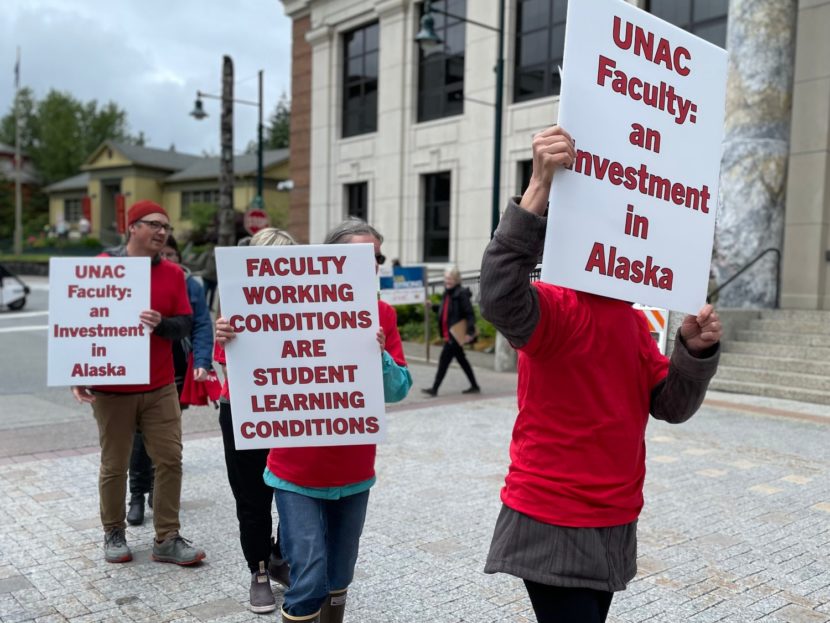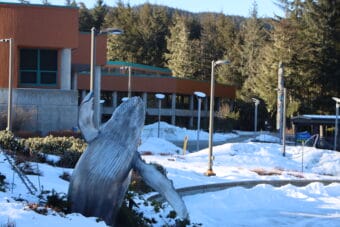
University of Alaska administration did not accept the latest proposed contract from its faculty union during a federal mediation session on Monday. Instead, it responded with another offer, which is confidential.
University associate vice president of public affairs Robbie Graham, speaking on behalf of the administration, said the administration and faculty union United Academics have been presenting package proposals, which are accepted in total or not at all.
“There were many elements in the most recent [United Academics] proposal that we agreed with, but we didn’t find the package entirely acceptable. So while we were unable to accept the union’s package in this ‘all or nothing’ format, our team did respond to it,” Graham said.
“Our team has been and will continue to work toward solving the remaining issues. We’ve already resolved 14 of them, and there is a genuine sentiment that an agreement is close,” she added.
Abel Bult-Ito called the administration’s rejection “very disappointing.” Bult-Ito is professor of neurobiology and neurophysiology at the University of Alaska Fairbanks, and president of the faculty union.
With the federal mediation sessions confidential, neither party could say what the sticking points were – whether it was the union’s proposal to receive any salary increases paid to other employee groups, the items that don’t deal with money, or other issues.
In the union’s latest contract proposal, the union made a concession by accepting the administration’s compensation offer. The administration’s original “best and final offer” included increases of 3%, 2.5% and 2% over three years. After further federal mediation, the administration upped the increases slightly in mid-July to 3%, 2.75% and 2.5%.
The union originally asked for salary increases of 5%, between 3% and 7%, and between 3% and 6% over three years, with the latter two years’ increases determined by the consumer price index. The union has said it wanted to see real cost of living adjustments that match inflation.
Still, it conceded at the end of July, accepting the administration’s salary offer in its new contract proposal. There was a caveat though: Any future, higher raises given to other employee groups will also be given to United Academics faculty.
Union members have received one 1% increase over the past six years.
What was still on the table going into the Aug. 22 mediation session were issues regarding disciplinary procedures, academic freedom issues and inclusion of all bargaining unit members in all elements of the contract.
“Everything is still on the table”
Contraction negotiations are poised to enter its second year with more mediation sessions scheduled for Aug. 31, Sept. 1, 19 and 28. In an update to its roughly 1,000 members, United Academics said it would continue to work on members’ behalf “towards a fair and equitable agreement.”
Even with the next federal meeting scheduled for Aug. 31, Bult-Ito said, “everything is still on the table,” options like filing a complaint against the administration of unfair labor practices with the Alaska Labor Relations Agency. Striking is another possible avenue.
“That’s our last resort because it’s going to harm our students. So, it certainly is on the table, but we’re trying to avoid it,” Bult-Ito said.
In an Aug. 22 letter to the UA community after mediation that day concluded, university President Pat Pitney wrote, “We are committed to a positive outcome and to ensuring that the needs of both the university and the faculty are addressed in the final contract.”
This is the second week faculty have been on contract as they prepare to welcome students into the classroom next week. Bult-Ito, who’s teaching two courses this semester, is looking forward to it.
“Teaching is my highlight of my job,” he said.
Even though morale among faculty is low, Bult-Ito said he won’t be bringing that energy into the classroom.
“My students will not know that we are in a difficult position because students come first. Students will not know in my day-to-day interaction with them that anything is wrong. I will always smile. I will always be available. I’ll always help them,” he said.
Classes start Aug. 29.



